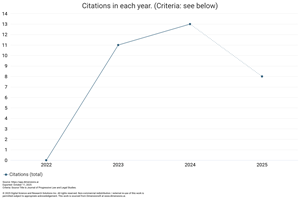Distribution of Authority for Mining Business Permits between the Central Government and Regional Governments After the Enactment of the Minerba Law Number 4 of 2009
DOI:
https://doi.org/10.59653/jplls.v1i02.46Keywords:
Mining, Central Government, Regional Government, Minerba Law, AuthorityAbstract
Mining commodities are strategic commodities for the Indonesian people because they are a source of state revenue. On the other hand, mining has a significant social, economic, and political impact. Therefore, the decision to grant a mining permit needs to be considered carefully. The Minerba Law of 2009 took over some authority to the Central Government. This takeover creates a conflict in the Regional Government which wants the authority to grant permits to reside with the regional government. By using normative analysis, this study tries to see the purpose of the Minerba Law Number 4 of 2009. This research shows that apart from granting permits, other factors need to be considered, namely how the mining sector provides revenue and benefits the local community.
Downloads
References
Bangsawan, M. I. (2022, April). Persoalan Hukum Penyelesaian Sengketa Agraria di Bidang Mineral dan Batubara menurut Undang-Undang Nomor 3 Tahun 2020 tentang Pertambangan Mineral dan Batubara. In Prosiding Seminar Nasional Program Doktor Ilmu Hukum (pp. 26-41).
Bentzen, Jeanet Sinding. (2012). ‘How bad is Corruption? Cross-Country Evidence of the Impact of Corruption on Economic Prosperity’. Review of Development Economics 16 (1), 167-184
Darmawan, B. (2017). Sumber Peningkatan Produktivitas Perusahaan Garmen di Indonesia dengan Adanya Penanaman Modal Asing Periode 2007-2013. Jurnal Ekonomi dan Bisnis, 22(1), 9-22.
Jalil, H. (2021). Kewenangan Pusat dan Daerah dalam Pengelolaan Pertambangan. Jurnal Ilmiah Mahasiswa Bidang Hukum Kenegaraan, 5(2), 132-140.
Manan, B., & Harijanti, S. D. (2017). Artikel Kehormatan: Peraturan Pemerintah Pengganti Undang-Undang dalam Perspektif Ajaran Konstitusi dan Prinsip Negara Hukum. Padjadjaran Jurnal Ilmu Hukum (Journal of Law), 4(2), 222-243.
Marbun, I. F. (2021). Dampak Investasi Sektor Pertambangan Terhadap Pertumbuhan Ekonomi Setelah Diterbitkannya UU No. 11 Tahun 2020.
Mayer, HDS. (2019). Pengaturan Pengawasan Pusat Terhadap Izin Usaha Pertambangan Mineral dan Batubara di Era Otonomi Daerah. Jurnal Legislasi Indonesia, 16(1), 133-146.
Ningrum, V. (2008). Penanaman Modal Asing dan Penyerapan Tenaga Kerja di Sektor Industri. Jurnal Kependudukan Indonesia, 3(2), 29-43.
Rahman, A. (2018). Dinamika Gerakan Sosial Masyarakat Samarinda dalam Memperjuangkan Keadilan Lingkungan (Studi Kasus Pada “Gerakan Samarinda Menggugat” Di Kalimantan Timur). Jurnal Analisa Sosiologi, 7(1).
Rao, N. L. (2018). Taxes and US oil production: Evidence from California and the windfall profit tax. American Economic Journal: Economic Policy, 10(4), 268-301.
Satriawan, D. D. (2021). Pengelolaan Usaha Pertambangan Mineral Dan Batubara Pasca Berlakunya Undang-Undang Nomor 11 Tahun 2020 Tentang Cipta Kerja. Jurnal Esensi Hukum, 3(2), 123-133.
Solechah, S. N. (2012). Realisasi desentralisasi sektor pertambangan. Jurnal Info Singkat Pemerintahan Dalam Negeri, 4.
Suparji, S., & Mizi, R. (2021). Penataan Regulasi Mineral Dan Batubara Untuk Kesejahteraan Rakyat. Jurnal Magister Ilmu Hukum, 4(2), 1-8.
Suseno, D. A. (2017). Multiplier Effect Sektor Basis Terhadap Perekonomian Daerah Provinsi Jawa Tengah. Jurnal REP (Riset Ekonomi Pembangunan), 2(1), 113-126.
Thendry, S. (2016). Desentralisasi Kewenangan Dalam Pengaturan Usaha Pertambangan Di Era Otonomi Daerah. Lex et Societatis, 4(4).
Umam, A. K. (2020). Reformasi Tata Kelola ataukah Resentralisasi Kekuasaan Negara? Arah Perubahan UU Minerba di Indonesia. Dalam Kuasa Oligarki atas Minerba Indonesia, 8-25.
Downloads
Published
How to Cite
Issue
Section
License
Copyright (c) 2023 Pandu Adi Cakranegara, Dedi Rianto Rahadi, Etty Susilowati

This work is licensed under a Creative Commons Attribution-ShareAlike 4.0 International License.
Authors who publish with this journal agree to the following terms:
- Authors retain copyright and grant the journal right of first publication with the work simultaneously licensed under a Creative Commons Attribution-ShareAlike that allows others to share the work with an acknowledgement of the work's authorship and initial publication in this journal.
- Authors are able to enter into separate, additional contractual arrangements for the non-exclusive distribution of the journal's published version of the work (e.g., post it to an institutional repository or publish it in a book), with an acknowledgement of its initial publication in this journal.
- Authors are permitted and encouraged to post their work online (e.g., in institutional repositories or on their website) prior to and during the submission process, as it can lead to productive exchanges, as well as earlier and greater citation of published work (See The Effect of Open Access).
























